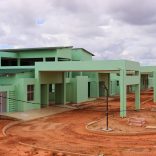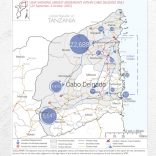Mozambique: Nampula awaits delivery of new hospital as HCN exhausts capacity
Mozambique: HRW accuses government of trying to silence NGOs

File photo: Lusa
The non-governmental organisation Human Rights Watch (HRW) has demanded the Mozambican government withdraw a draft law on the operation of these organisations, which it considers a threat to civil society and freedom of association.
In a commentary consulted today by Lusa, HRW criticised article 33, which imposes the annual submission to the authorities, by non-governmental organisations, of information relating to their regular operation and source of funding.
The international human rights organisation also criticised Article 36, which empowers the ministry of justice to close civil society organisations that do not submit information on their operation and source of funds.
HRW also rejects the requirement of a minimum of ten members over the age of 18 years for the creation of a national NGO, imposed in Article 12 of the proposal.
The organisation also notes that conventions ratified by the Mozambican state expressly stipulate that the dissolution of non-governmental organisations for violation of the law should be decided by judicial order and not by the government.
“The African Commission’s directives state that the suspension of any association for serious violation of the law can occur only by order of a court, and dissolution can occur at the culmination of due legal process and after exhausting available mechanisms.”
HRW attacked the government’s argument that the draft law aims to stop the financing of terrorism, pointing out that this objective should not serve as a pretext to silence civil society.
“The Mozambican authorities should not use the fight against Al-Shabab,” in an allusion to terrorism in Cabo Delgado (north of the country), “as an excuse to repress civil society organisations,” said Ashwanee Budoo-Sholtz, HRW’s Deputy Director for Africa.
READ: Mozambique: Draft Law threatens civil society groups – Human Rights Watch | Unabridged
Al-Shabab is the name by which the communities of Cabo Delgado province, northern Mozambique, refer to the armed groups that terrorise the region, in an analogy with the Somali extremist group known by that name.
The international organisation quoted the executive director of the Centre for Democracy and Development (CDD), Adriano Nuvunga, as saying that by taking it upon itself to extinguish associations, Maputo “clearly violates the Constitution of the Republic and the African Charter on Human and Peoples’ Rights.
“This proposal comes to silence civic space and democracy,” Nuvunga stressed.
Paula Monjane, executive director of the Civil Society Learning and Capacity Building Centre (CESC), quoted by HRW, also repudiated the proposal, warning that the Mozambican executive “is intentionally trying to shut down organisations that fight for transparency and good governance”.
Edson Cortez, executive director of the Centre for Public Integrity (CIP), quoted in the same commentary, argued that this is “an attempt to control organisations, in a context in which Frelimo [ruling party Frente de Libertação de Moçambique] is aware that the only structured voices arguing against its governance are in civil society.
HRW points out that the Mozambican authorities are using the fact that the country has been placed on the grey list of the Financial Action Task Force (FATF). This international mechanism assesses the readiness of countries to combat terrorist financing and money laundering to try to legitimise the need for the proposal.
The document criticised by the organisations counts as item number seven on the agenda of the next plenary session of the Assembly of the Republic, which kicks off on the 22nd.













Leave a Reply
Be the First to Comment!
You must be logged in to post a comment.
You must be logged in to post a comment.